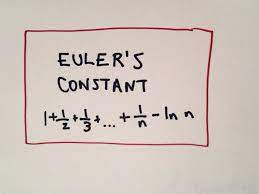The Euler Constant

What is Euler's Constant?
What Is Euler's Constant? Euler's constant (sometimes called Euler's number or the Euler–Mascheroni constant.) is a mathematical expression for the limit of the sum of 1 + 1/2 + 1/3 + 1/4 ... + 1/n, minus the natural log of n as n approaches infinity. Euler's constant is represented by either e or the lower case gamma (γ) and appears in calculus as a derivative of a logarithmic function. It is the difference between a harmonic series and the natural logarithm (log base e). There is no closed-form expression for the harmonic number, but gamma can provide an estimate of it. KEY TAKEAWAYS
- Euler's constant is an important number that is found in many contexts and is the base for natural logs.
- An irrational number denoted by e, Euler's constant is 2.71828..., where the digits go on forever in a never-ending series (similar it pi.)
- Euler's constant is used in everything from explaining exponential growth to radioactive decay, to continuous compounding of interest rates.